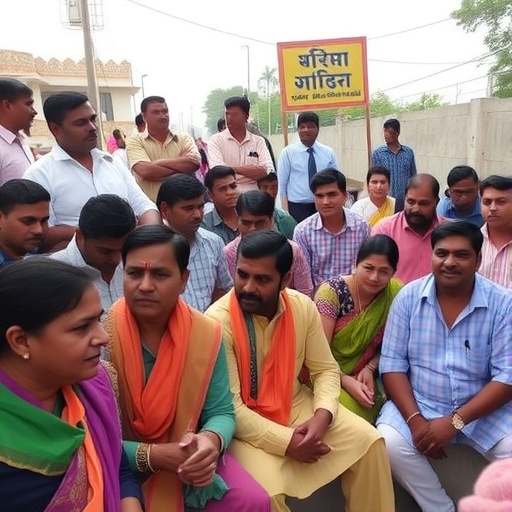West Bengal Grapples with Booth Level Officer Shortage in Critical Electoral Roll Revision Before Assembly Elections
In a stark revelation that could jeopardize the integrity of upcoming assembly polls, the Chief Electoral Officer of West Bengal has disclosed significant hurdles in recruiting Booth Level Officers (BLOs) for the Special Intensive Revision (SIR) of the electoral roll. This challenge, announced amid heightened political tensions, underscores vulnerabilities in election preparedness and raises alarms over voter safety in a state notorious for electoral volatility.
- Chief Electoral Officer Exposes Recruitment Roadblocks in West Bengal’s Electoral Machinery
- Special Intensive Revision Stumbles Amid West Bengal’s Voter Enrollment Push
- Safety Fears for Booth Level Officers Fuel Election Preparedness Alarms
- Political Storm Brews as Parties Clash Over Electoral Roll Integrity
- Urgent Measures and Path Forward for West Bengal’s Election Safeguards
The announcement comes at a pivotal time, with West Bengal‘s assembly elections slated for early 2026. BLOs, the grassroots warriors of the electoral process, are essential for verifying voter lists, updating details, and ensuring accurate electoral rolls. Without sufficient numbers, the SIR—designed to purge inaccuracies and enroll new voters—risks falling short, potentially disenfranchising millions in a state with over 7.2 crore registered voters.
Officials report that recruitment drives have hit roadblocks due to a mix of administrative delays, security concerns, and a shrinking pool of willing candidates. This isn’t just a logistical snag; it’s a potential flashpoint in West Bengal’s fractious politics, where past elections have seen violence and disputes over voter lists.
Chief Electoral Officer Exposes Recruitment Roadblocks in West Bengal’s Electoral Machinery
Amitabh Ranjan, the Chief Electoral Officer (CEO) of West Bengal, laid bare the recruitment crisis during a press briefing in Kolkata on October 15, 2024. “We are facing unprecedented difficulties in appointing Booth Level Officers for the SIR,” Ranjan stated, emphasizing that the process requires around 1.2 lakh BLOs across the state’s 294 assembly constituencies. “The shortfall could delay the revision and compromise the accuracy of our electoral roll,” he added, highlighting how applications have dwindled by nearly 30% compared to the last cycle in 2021.
The role of BLOs is non-negotiable in India’s electoral framework. These officers, often local schoolteachers, government employees, or community leaders, are tasked with door-to-door verification, collecting forms for additions, deletions, and corrections in the electoral roll. In West Bengal, where urban-rural divides and migration patterns complicate voter registration, BLOs serve as the first line of defense against fraud and omissions.
Statistics from the Election Commission of India (ECI) paint a grim picture: West Bengal’s electoral roll currently lists 72.8 million voters, but the SIR aims to add at least 5-7 lakh new electors while removing duplicates and deceased entries. Ranjan noted that only 65% of the required BLO positions have been filled so far, with hotspots like Kolkata, Howrah, and the violence-prone Jangalmahal region lagging the most. “Security threats to BLOs in sensitive areas are a major deterrent,” he explained, referencing incidents from the 2021 elections where several BLOs faced intimidation.
This recruitment crunch isn’t isolated. A 2023 ECI report indicated that states like West Bengal and Bihar struggle with BLO retention due to low incentives—BLOs receive a meager honorarium of Rs 1,500-2,000 per month—coupled with political pressures. In West Bengal’s charged political atmosphere, where the ruling Trinamool Congress (TMC) dominates, opposition parties like the BJP have accused the administration of bias in appointments, further complicating the process.
Special Intensive Revision Stumbles Amid West Bengal’s Voter Enrollment Push
The Special Intensive Revision, kicked off on October 5, 2024, is a cornerstone of election readiness, mandated by the ECI every five years or before major polls. In West Bengal, it’s particularly crucial given the state’s history of electoral controversies. The 2021 assembly elections saw over 1,000 complaints related to electoral roll inaccuracies, leading to court interventions and protests.
Under the SIR, BLOs must visit households to distribute forms (Form 6 for new registrations, Form 7 for deletions) and compile data by November 25, 2024, with final publication targeted for January 6, 2025. However, the officer shortage threatens this timeline. In rural districts like Murshidabad and Malda, where migrant workers from Bangladesh and internal laborers skew voter lists, BLOs are vital for cross-verifying identities.
Consider the numbers: West Bengal added 12 lakh voters during the last SIR in 2019, but experts warn that this cycle could see a shortfall of up to 20% in enrollments without adequate BLOs. Dr. Sumantra Bose, a political scientist at Jadavpur University, commented, “The electoral roll is the bedrock of fair elections. In West Bengal, where politics is deeply polarized, any glitch here could amplify accusations of rigging and erode public trust.”
Moreover, the process integrates technology like the ECI’s Voter Helpline app and Aadhaar linkage, but BLOs remain the human interface. Reports from the ground indicate that in 40% of polling stations in South 24 Parganas, BLO vacancies persist, forcing temporary assignments that dilute effectiveness. The CEO’s office has issued directives for expedited training, but with only weeks left, the pressure mounts.
Urban challenges add another layer. In Kolkata’s dense slums, BLOs navigate overcrowding and undocumented residents, often facing resistance due to privacy fears. A pilot survey in the city revealed that 15% of potential voters remain unlisted, a gap that BLOs must bridge. Without them, the electoral roll risks inflating with ghosts—fictitious entries that have plagued past West Bengal elections.
Safety Fears for Booth Level Officers Fuel Election Preparedness Alarms
Beyond logistics, safety emerges as the elephant in the room. West Bengal’s elections have a dark underbelly, with the 2021 polls marred by over 1,300 violent incidents, including attacks on election officials. BLOs, operating at the booth level, are prime targets in this volatile mix of politics and local power dynamics.
Ranjan underscored this in his briefing: “Many potential BLOs are hesitant due to past threats. We’ve enhanced security protocols, but the fear factor is real.” Data from the West Bengal Police shows that 25 BLOs were assaulted during the 2021 Lok Sabha polls, prompting calls for better protection. In areas like Nandigram and Singur—symbols of political strife—recruitment rates hover below 50%.
The interplay of safety and politics is stark. Opposition leaders, including BJP’s Suvendu Adhikari, have alleged that TMC cadres intimidate BLOs perceived as non-partisan. “This shortage is no accident; it’s a ploy to manipulate the electoral roll in TMC’s favor,” Adhikari claimed in a recent statement. Conversely, TMC spokesperson Derek O’Brien dismissed such claims, saying, “The state government is committed to a free and fair process. Delays stem from bureaucratic hurdles, not malice.”
ECI guidelines mandate BLO neutrality, but enforcement is tricky in West Bengal’s partisan landscape. A 2024 survey by the Centre for Media Studies found that 60% of BLOs in the state feel politically pressured, deterring applicants. To counter this, the CEO has proposed incentives like insurance coverage and rapid response teams, but implementation lags.
The ripple effects on election preparedness are profound. Incomplete electoral rolls could lead to longer queues, disputes at polling stations, and post-poll litigation—hallmarks of West Bengal’s electoral history. With assembly polls approaching, stakeholders worry about disenfranchisement, especially among youth and migrants who form a burgeoning voter base.
Political Storm Brews as Parties Clash Over Electoral Roll Integrity
The BLO shortage has ignited a political firestorm in West Bengal, where elections are less about ballots and more about battlegrounds. The BJP, eyeing a comeback after 2021’s drubbing, has seized on the issue to question the TMC’s governance. “This is a deliberate sabotage of democracy,” thundered state BJP president Sukanta Majumdar, demanding ECI intervention and central oversight.
TMC, holding a supermajority with 213 seats, counters that the opposition’s rhetoric exacerbates the problem by scaring off candidates. Chief Minister Mamata Banerjee, in a rally last week, vowed, “We will ensure every eligible voter is on the roll. No one will be left out.” Yet, internal party sources reveal friction, with some TMC leaders accused of influencing BLO selections in their strongholds.
The Left Front and Congress, minor players, have urged a tripartite dialogue involving the ECI, state, and parties. CPI(M) leader Mohd. Salim stated, “The electoral roll must be apolitical. BLO shortages reflect systemic failures under TMC rule.” This cross-party scrutiny amplifies the stakes, as the SIR’s success could sway voter turnout—a key factor in West Bengal’s swing constituencies.
Historically, electoral roll disputes have fueled unrest. In 2016, similar issues led to the Supreme Court’s involvement, delaying polls. Analysts predict that if unresolved, the current crisis could mirror that, with petitions flooding courts. The ECI has deployed additional observers to West Bengal, but their efficacy depends on ground-level BLOs.
Broader politics looms large. With national eyes on West Bengal as a TMC stronghold against BJP’s national push, the BLO imbroglio tests alliances and narratives. Women’s reservation under the 33% quota adds urgency, as BLOs must verify gender data amid rising female voter participation—now at 49% in the state.
Urgent Measures and Path Forward for West Bengal’s Election Safeguards
As the SIR deadline looms, the CEO’s office is scrambling with contingency plans. Ranjan announced the recruitment of 20,000 additional BLOs from retired officials and volunteers, alongside digital drives via the ECI portal. Training modules, now shortened to two days, incorporate safety drills and anti-intimidation protocols.
Collaborations with NGOs and educational institutions aim to fill gaps, targeting 80% coverage by mid-November. The state government has allocated Rs 50 crore for BLO incentives, including a one-time bonus of Rs 5,000. However, experts like Election Watchdog’s Jagdeep Chokker caution, “Band-aid solutions won’t suffice. Structural reforms, like permanent BLO cadres with competitive pay, are needed.”
Looking ahead, the implications for West Bengal’s assembly elections are seismic. A robust electoral roll could boost turnout from 2021’s 77.7% to over 80%, empowering new demographics. Yet, persistent shortages risk chaos, eroding faith in institutions and fueling polarization.
The ECI plans a mid-review on November 1, with potential extensions if BLO numbers don’t rebound. Political parties have been summoned for awareness campaigns to encourage applications. In this high-stakes game, resolving the BLO crisis isn’t just administrative—it’s essential for safeguarding democracy in West Bengal’s turbulent political arena.
For voters, the message is clear: Check your status on the ECI app and report discrepancies. As West Bengal hurtles toward polls, the battle for a clean electoral roll underscores that in politics, preparation is power.








